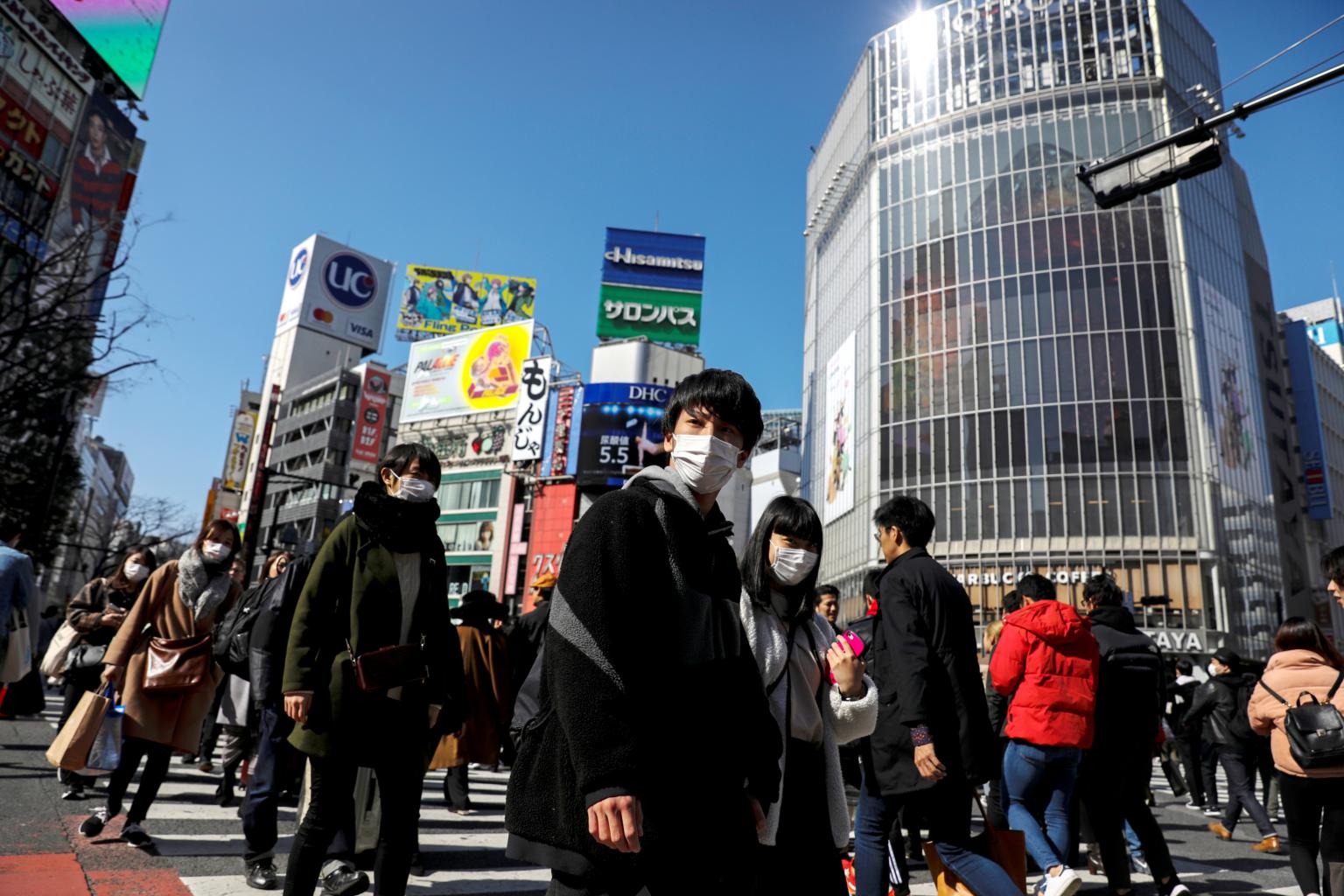Coronavirus: Could situation in Japan be much worse than reported?
Sign up now: Get insights on Asia's fast-moving developments

People wearing protective masks in the Shibuya shopping district in Tokyo, Japan, on Feb 24, 2020.
PHOTO: REUTERS
TOKYO - Japan has cancelled concerts, closed museums and shut schools, with local experts warning that the next two weeks will make or break the country's coronavirus battle.
But this is happening amid rising doubts on the actual number of Covid-19 cases in the country, which detractors say may be grossly understated.
It comes as multiple cases with no previous known links emerged across the country, casting doubt that infections are being effectively detected.
While Japan has the capacity to test up to 3,800 people a day, Health Minister Katsunobu Kato told the Diet this week that it conducts only an average 900 tests a day.
Medical institutions are, in the meantime, reportedly turning away prospective patients of Covid-19, citing reasons such as a lack of manpower, a fear of in-hospital transmission and the government's ambiguous testing criteria.
This mandates tests for close contacts of confirmed patients and those who have recently travelled to infected areas, while all others are essentially "up to the doctor's overall discretion".
But the Japan Medical Association (JMA) has also pointed out that there have been cases of member doctors referring patients to public health centres equipped for polymerase chain reaction (PCR) tests, but being refused.
"There is widespread suspicion that virus testing is not being done so as to suppress the number of confirmed infections," lawmaker Hiroshi Kawauchi of the main opposition Constitutional Democratic Party of Japan (CDP) said in the Diet on Thursday (Feb 27).
"Shouldn't the policy be to expand testing, detect infections early and to control clusters?"
Mr Kato denied that the government had been suppressing tests or trying to reduce the number of infections arbitrarily.
He said: "It is now important for us to increase the PCR testing capacity and expand criteria by which tests are conducted."
The source of this allegation is a chart, cited in Japanese media this week and widely shared on social media, that showed that South Korea had tested 40,304 people in total as of 4pm on Tuesday, of whom 977 were positive.
But despite Japan's ability to test up to 3,800 people a day, the latest Health Ministry figures show that as of 12pm on Wednesday, Japan had tested just 1,890 people altogether, of whom 164 people were positive.
They exclude Chinese visitors who have tested positive in Japan, as well as the 3,711 people who were on board the Diamond Princess cruise liner.
Together with Diamond Princess patients, a total of 6,300 tests were done between Feb 18 and Monday, Mr Kato said on Wednesday.
CDP leader Yukio Edano said: "There are many people who say they cannot be tested although their fever continues. Resources are not being fully mobilised."
Japan had bristled at having the patient count of the Diamond Princess - which it took in on humanitarian grounds, as a majority of the cruise passengers were Japanese - added to its overall infections count due to the potential tourism and economic impact.
The World Health Organisation (WHO) concurred, saying that doing so would set a bad precedent by which countries will turn away cruise liners during an infectious diseases outbreak.
Meanwhile, there have been seven deaths in Japan, comprising three domestic cases and four former passengers of the Diamond Princess.
Two of the three domestic cases - a woman in her 80s in Kanagawa and a man in his 80s in Hakodate in Hokkaido - were confirmed to have been suffering from Covid-19 only in the postmortem stage, raising questions if earlier medical intervention might have been possible, should the right diagnosis been made sooner.
Separately, in the first such case in Japan, a previous Covid-19 patient in Osaka, who tested negative for the coronavirus on Feb 6, tested positive again on Wednesday.
Experts are split over Japan's cautious approach.
While some say that it is necessary to avoid causing panic and overwhelming the medical system, others have urged the government to make full use of its testing capacity to assuage unease.
"At the very least, the government should make it possible for anyone with pneumonia symptoms to be tested for the coronavirus wherever they are. It also needs to speed up inclusion of these tests under the public health insurance system," the Mainichi daily said in an editorial on Thursday.
Still, Dr Norio Ohmagari, director of infectious diseases at the National Centre for Global Health and Medicine, said: "It's extremely difficult to distinguish between the common cold and Covid-19. If we try to test all the people who seem to have a common cold, it will be a disaster for hospitals.
"Many will just go for outpatient and (proper attention cannot be given) to sick patients who require intensive care."


